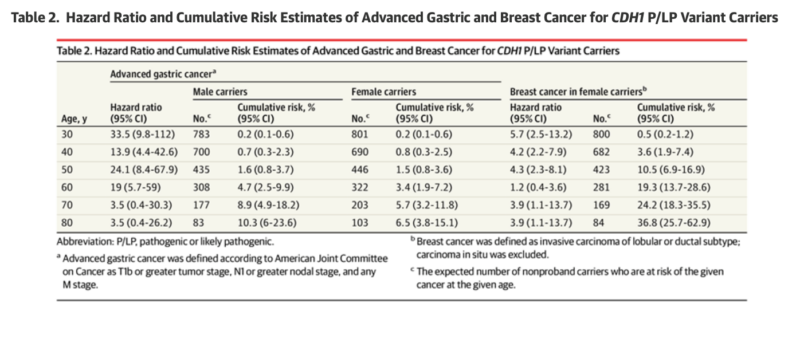New Study Reveals Lower than Expected Gastric Cancer Risk for CDH1 Mutation Carriers
Authors: Carrie E. Ryan, MD; Grace-Ann Fasaye, ScM; Amber F. Gallanis, MD; Lauren A. Gamble, MD; Paul H. McClelland, MD; Anna Duemler, MS; Sarah G. Samaranayake, MS; Andrew M. Blakely, MD; Christine M. Drogan, MS; Kerry Kingham, MS; Devanshi Patel, MS; Linda Rodgers-Fouche, MGC; Ava Siegel, BS; Sonia S. Kupfer, MD; James M. Ford, MD; Daniel C. Chung, MD; James G. Dowty, PhD; Joshua Sampson, PhD; Jeremy L. Davis, MD
Published in JAMA Network on June 14, 2024.
Introduction
Hereditary diffuse gastric cancer and lobular breast cancer are often caused by pathogenic variants in the CDH1 gene. Accurate estimation of cancer risks associated with these mutations is crucial for guiding preventive strategies and clinical management.
However, previous risk estimates have been highly variable, ranging from 25% to 83% for gastric cancer and 39% to 55% for breast cancer. These estimates were derived from small studies of high-risk families or potentially biased clinical testing cohorts.
The varying risk estimates have created uncertainty for healthcare providers and patients regarding appropriate interventions, such as prophylactic total gastrectomy or enhanced surveillance.
A more precise understanding of cancer risks is needed to optimize shared decision-making and personalize care for individuals with CDH1 mutations.
Design and Methods
The study was a multicenter, retrospective cohort analysis of 213 families from North America with at least one family member carrying a pathogenic or likely pathogenic (P/LP) CDH1 variant. The researchers analyzed data from 7,323 individuals, including 883 CDH1 P/LP variant carriers, to estimate the hazard ratios (HRs) and cumulative lifetime cancer risks.
What We Learned
This large, multicenter study involving 213 families from North America provides updated and potentially practice-changing insights into the cancer risks associated with pathogenic and likely pathogenic (P/LP) CDH1 variants. The key findings include:
1. Lower Gastric Cancer Risk: The cumulative lifetime risk of advanced gastric cancer (stage ≥II) by age 80 was estimated to be 10.3% (95% CI, 6%-23.6%) for male carriers and 6.5% (95% CI, 3.8%-15.1%) for female carriers. These risk estimates are substantially lower than previously reported, which ranged up to 83%.
2. Breast Cancer Risk Aligned with Prior Estimates: For female carriers, the cumulative risk of breast cancer by age 80 was 36.8% (95% CI, 25.7%-62.9%), which is consistent with prior estimates of 39% to 55%.
3. Impact of Family History: Individuals with a strong family history of gastric cancer (3 affected first-degree relatives) had an estimated lifetime risk of 38% (95% CI, 25%-64%) due to the combined effect of the CDH1 variant and other heritable risk factors.
4. Age-specific Risks: Female carriers aged 40 to 69 years had a higher probability of developing breast cancer than gastric cancer during the same period.
5. Variant Prevalence and Cancer Associations: The most common CDH1 variant, c.2064_2065del, was observed in 8.7% of carriers and was associated with a 13% prevalence of gastric cancer and 25% prevalence of breast cancer.

Key Highlights
- The prevalence of advanced gastric cancer among CDH1 P/LP variant carriers was 13.9%, closely corresponding to the estimated cumulative risk.
- Individuals with a strong family history of gastric cancer (3 affected first-degree relatives) had an estimated lifetime risk of 38% (95% CI, 25%-64%) due to the combined effect of the CDH1 variant and other heritable risk factors.
- Female carriers aged 40 to 69 years had a higher probability of developing breast cancer than gastric cancer during the same period.
- The most common CDH1 variant, c.2064_2065del, was observed in 8.7% of carriers and had a 13% prevalence of gastric cancer and 25% prevalence of breast cancer.
Key Takeaway Messages
- The estimated lifetime risk of advanced gastric cancer associated with CDH1 P/LP variants was lower than previously reported, ranging from 7% to 10%.
- The breast cancer risk estimate of 37% for female carriers aligns with prior studies.
- These findings can inform clinical decision-making regarding risk-reducing surgeries and surveillance strategies for individuals with CDH1 variants.
- The authors emphasise the need for validation in independent and diverse cohorts to refine precision clinical management further.
Summary by Amalya Sargsyan, MD
Germline CDH1 Variants and Lifetime Cancer Risk


